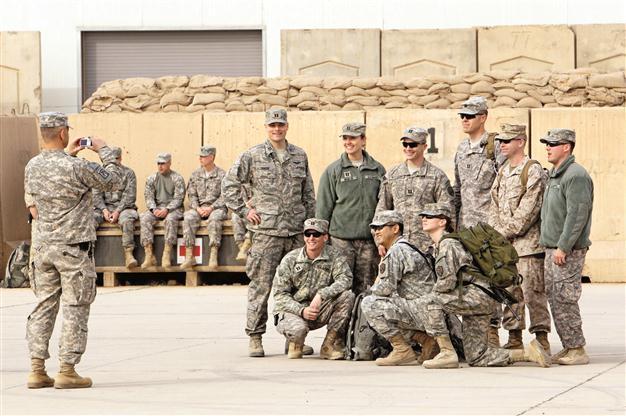US lowers flag in Iraq, ends long occupation
BAGHDAD

US soldiers pose for a group picture after a symbolic flag-lowering ceremony marking the end of the US mission in Iraq at a military base West of Baghdad. AFP photo
After nearly nine years, more than 100,000 dead, tens of thousands wounded, 1.75 million displaced and more than $800 billion spent, U.S. officials formally shut down the war in Iraq yesterday.“After a lot of blood spilled by Iraqis and Americans, the mission of an Iraq that could govern itself has become real,” Panetta said at the symbolic flag-lowering ceremony staged near Baghdad’s airport attended by several other U.S. diplomatic, military and defense leaders. During the ceremony the joint U.S. Forces-Iraq flag was officially retired, or “cased,” according to U.S. military tradition, the Associated Press reported. The U.S. Forces-Iraq flag was furled, or wrapped, around a flagpole and covered in camouflage. It will be taken back to the United States.
More than 100,000 Iraqis have been killed since the U.S. invasion in 2003, along with 4,500 Americans, according to the Iraq Body Count website. Bombings and gun battles are still common, and experts are concerned about the Iraqi security force’s ability to defend the nation against foreign threats.
“Iraq will be tested in the days ahead by terrorism and by those who would seek to divide it, by economic and social issues, [and] by the demands of democracy itself,” said Panetta, Agence France-Presse reported.
As of yesterday, there were two U.S. bases and approximately 4,000 U.S. troops in Iraq, a dramatic drop from the roughly 500 military installations and as many as 170,000 troops during the surge ordered by President George W. Bush in 2007, when violence and raging sectarianism gripped the country. All U.S. troops are slated to be out of Iraq by the end of the year.
U.S. officials were unable to reach an agreement with the Iraqis on legal issues and troop immunity that would have allowed a small training and counterterrorism force to remain. Still, despite President Barack Obama’s earlier contention that all American troops would be home for Christmas, at least 4,000 soldiers will remain in Kuwait for some months. The troops will be able to help finalize the move out of Iraq, but could also be used as a quick reaction force if needed.
‘Dumb wars’
The ceremony at Baghdad International Airport also featured remarks from Army Gen. Martin Dempsey, chairman of the Joint Chiefs of Staff, and Gen. Lloyd Austin, the top U.S. commander in Iraq. Austin, the commander United States Forces-Iraq (USF-I), cased the flag at the ceremony, rolling the USF-I flag around its pole and covering it with a camouflage bag.
Military Chief of Staff Lieutenant General Babaker Zebari and defense ministry spokesman Major General Mohammed al-Askari represented Iraq at the ceremony. “For over 20 years, Iraq has been a defining part of our professional and personal lives,” said Dempsey. “We will remember you and those that have gone before – what you risked, what you learned, how you sacrificed... and the fallen comrades for whom we all still grieve.”
The ceremony comes a day after hundreds of people in Fallujah marked the impending departure of American forces by burning U.S. flags and shouting slogans in support of the “resistance.” Bush, Obama’s predecessor, ordered the invasion of Iraq in 2003, arguing Saddam was endangering the world with weapons of mass destruction programs. Saddam was ousted from power and later executed, but such arms were never found.
Obama made his political career by opposing the war. In late 2002, he said he was against “dumb wars” such as Iraq, and rode anti-war fervor to the White House by promising to bring troops home. “We are leaving behind a sovereign, stable, and self-reliant Iraq, with a representative government that was elected by its people.”
















